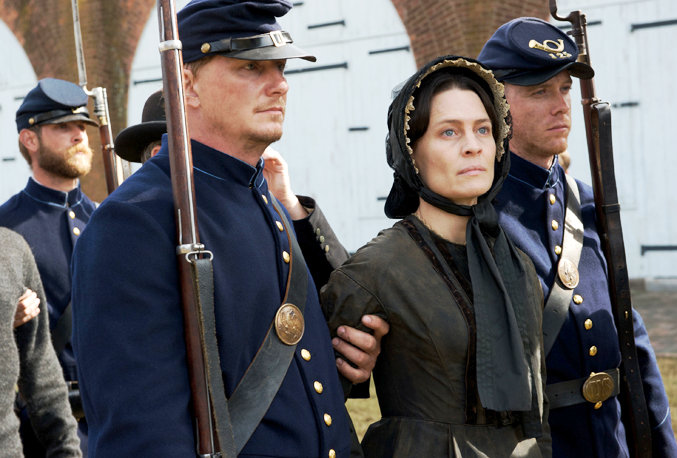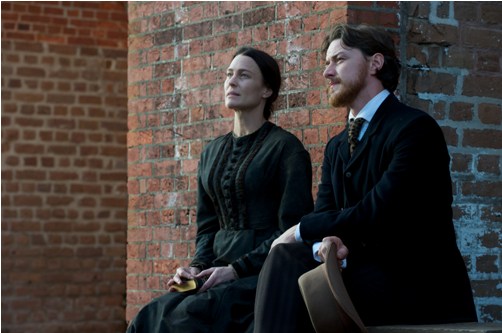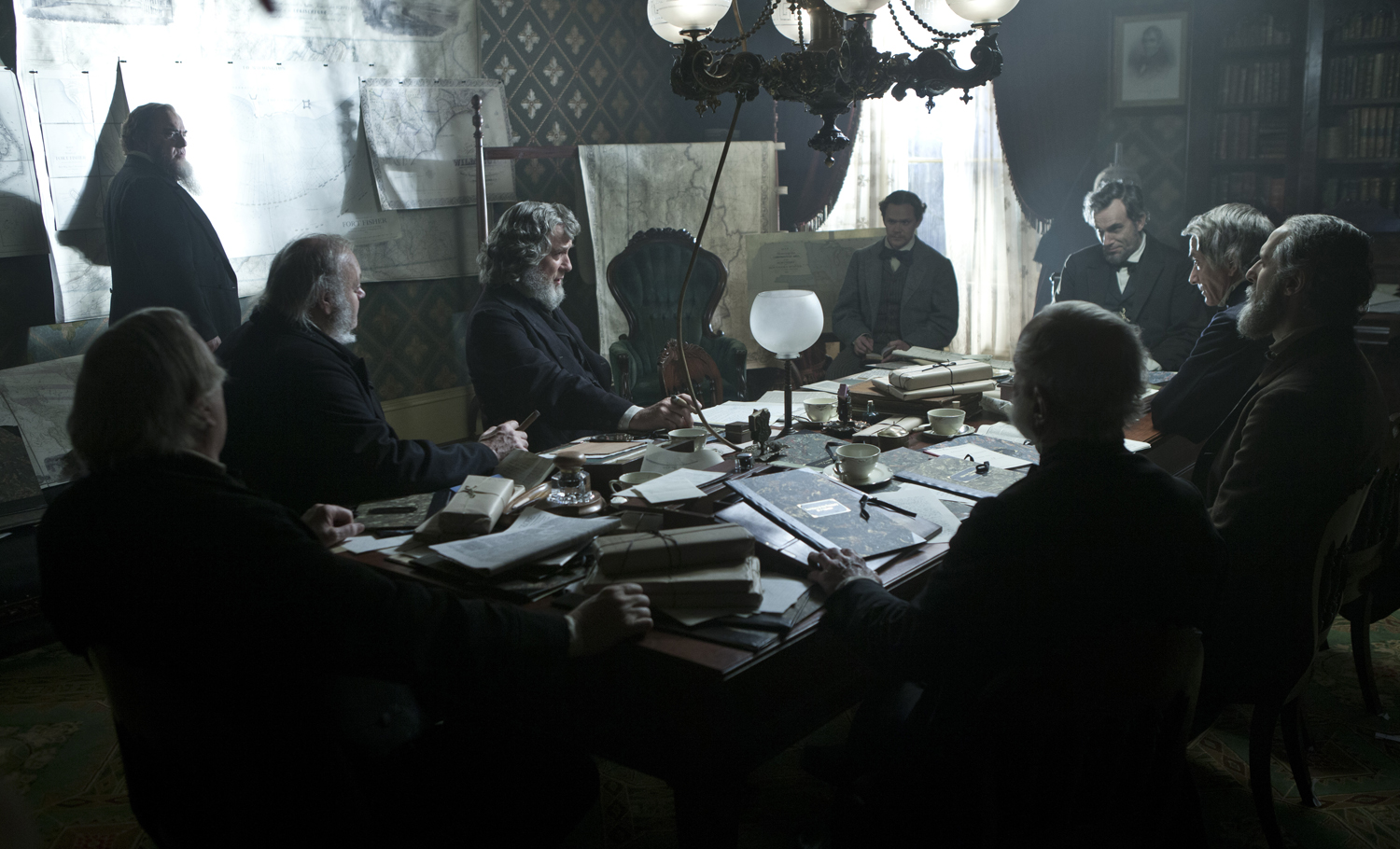
“
The military trial of civilians is an atrocity!” Why, yes, yes it is. And, if you didn’t think so already,
Robert Redford’s The Conspirator, an occasionally flat but still edutaining courtroom drama, aims to sway you to that point of view by coming strong with the history — in this case, the
1865 trial of Mary Surratt for her alleged role in the murder of President Lincoln.
The good news is The Conspirator is nowhere near as preachy and inert as Redford’s last attempt at liberal muck-raking, Lions for Lambs. (I’ll confess I don’t have much patience for didactic message movies that bray at me to embrace opinions i already hold — See also Paul Greengrass’ Green Zone.) Nonetheless, this film still occasionally suffers from the same mix of well-meaning blandness and dramatic torpor that characterizes almost all of Amistad, Steven Spielberg’s similar 19th century courtroom exercise: The values being reified are all laudable, to be sure, but the story as told is strangely lifeless (and I say that as someone who probably enjoys the genre of movies-to-be-shown-in-high-school-history-when-the-teacher-is-out more than most.)
Fortunately, the movie grew on me after awhile. Its depiction of broader Washington DC often feels stagy, and some of the acting support here doesn’t help matters. (As Surratt’s daughter Anna, Evan Rachel Wood overdoes it in her every scene, and the very 21st-century Justin Long is just miscast here as a Union veteran.) But as the lens of the story narrows down to the nitty-gritty of the court case in its middle hour, The Conspirator finds a surer footing. At its best moments, Redford’s film feels like an episode of Law and Order: Civil War Unit, one whose resonances — military tribunals, indefinite detentions, victor’s justice, and whatnot — still feel “ripped from the headlines.”
After establishing that our protagonist here, Frederick Aiken (James McAvoy, with an impressive American accent — he should help out his countryman Ewan) is a Union war veteran wounded in his nation’s service, The Conspirator begins with the terrible crime that will concern us. On the night of April 14, 1865, only five days after Lee’s surrender at Appomattox, several men attempt to kill President Lincoln, Vice-President Johnson, and Secretary of State Seward, with mixed results. Seward manages to survive some nasty stab wounds, Johnson’s killer loses his nerve…but, as we all know, the flamboyant actor-turned-assassin John Wilkes Booth manages to kill the 16th President of the United States in cold blood. It is a horrible act of treason, the first assassination America has ever seen, and, make no mistake, everyone involved will pay.
And so, under the direction of Secretary of War Edwin Stanton (Kevin Kline, only slightly less Cheneyesque than Richard Dreyfuss in W) the conspirators (minus Booth, who is shot during capture) are rounded up and put on, for all intent and purposes, show trial — one headed by military men and quite clearly designed to come back with guilty verdicts. (FWIW, this film mostly elides over the Manhunt part of the story.) Nonetheless, according to that quaint old Constitution, even such dastardly criminals as these deserve defense counsel, and ultimately the young Union lawyer we met at the outset is roped into defending Mary Surratt (Robin Wright) by his mentor, Maryland senator Reverdy Johnson (Tom Wilkinson).
Captain Aiken takes to his new position reluctantly, especially since he feels pretty certain that Surratt — the proprietress of the boarding house where the conspirators plotted — is guilty as all Hell. But as he learns more of Surratt and her pious Christian, Ur-mother ways, he starts to wonder if maybe she’s just taking the fall for her son John (Johnny Simmons of Jennifer’s Body), who is still on the lam. And, as he grows ever more sick of the obvious railroading happening at trial under the direction of Judge David Hunter (Colm Meaney) and prosecutor Joseph Holt (Danny Huston, doing his officiously sinister bureaucrat thing), Aiken becomes a convert to his duties, even as proper Washington society begins to shun him for seeming to take on the Confederate cause. Sometimes a man has to make a stand, etc. etc.
I don’t know much about the Mary Surratt trial other than what Wiki has to offer, so I can’t tell you if Redford and screenwriter James Solomon have done justice to the specifics of the story — It seems to have a versimilitude about it, at any rate. But one place where I thought The Conspirator faltered is in establishing the Big Picture. True, the film begins grimly with Lincoln’s assassination — hard to fault it there, I suppose. But particularly once the courtroom scenes take hold, it doesn’t do a very good job of putting everything in emotional context — that all of this is happening mere days and weeks right after the close of America’s bloodiest war. (Nor, for that matter, is slavery mentioned.) And so, while the Law and Order aspects of the story are often compelling in their own right, the trial also feels flat, and strangely disconnected from all the events that put it in motion.
Which is too bad, really. Since, if anything, that Civil War backdrop adds depth to the viewpoint Redford seemed to be trying to uphold. There we were after four years of bloody war, 600,000 dead and the president assassinated, and Aiken is still taking a stand for the constitutional rights of Mary Surratt — even though an innocent verdict might well put the sides at each other’s throats again. (Contrast this with the cowardly behavior our past two administrations have shown with regard to tribunals, detentions, Gitmo, etc, even though, neither on 9/11 or since, has Al Qaeda ever represented the kind of existential threat to our republic that we faced in 1865.)
Speaking of the Civil War angle: In a way, I admire the shrewdness of this film: It tries to pitch a civil liberties morality play in such a way that the people who will feel most aggrieved about the injustices being shown, civil libertarians notwithstanding, are the folks among us with residual sympathy for the Confederacy — not normally a left-leaning or libertarian bunch. But, let’s get real: They’re not going to see this film, or, if they do, see it as anything other than lefty propaganda. Like Inside Job or Casino Jack and the United States of Money, The Conspirator is for the most part just preaching to the choir. One of the best things you can say about it is that, for the middle hour at least, you may not mind humming along.








